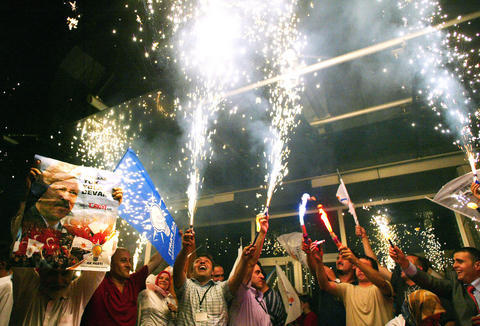Turkish newspapers said yesterday that Prime Minister Recep Tayyip Erdogan's decisive election win was a public backlash against the military, which had threatened his government and sparked snap polls.
"The nation has the last word," the moderate Islamist Zaman said, referring to an army communique in April warning Erdogan's government that it would step in if necessary to protect Turkey's secular credentials -- a step which finally led to Sunday's elections.
Erdogan's Islamist-rooted Justice and Development Party (AKP) won a second term in power after sweeping 46.3 percent of the vote.

PHOTO: AP
The vote was brought forward from November after an opposition boycott in parliament prevented the AKP from electing one of its own people as president in April.
"If it had not been for the [military] memorandum, if there had been no outside intervention in politics ... the AKP share of the vote would not have gone to nearly 47 percent," wrote Ismet Berkan, editor-in-chief of the liberal daily Radikal.
The mass-circulation Hurriyet said: "The people do not like governments that quarrel with the soldiers, but the people also do not like military intervention."
The Aksam daily described Erdogan's victory as "The Third People's Revolution", saying he had become the third highest vote earner in Turkey since multi-party democracy was introduced in 1946.
The AKP also became the first Turkish party in 50 years to increase its votes in a re-election, despite opposition efforts to portray the Islamist-rooted party as a Trojan horse set to turn Turkey into an Iranian-style theocracy.
Erdogan on Sunday vowed to press on with reforms to turn Turkey into a modern democracy on a par with its European neighbors.
It was a personal triumph for Erdogan, a controversial but extremely popular politician.
Two other, secularist, parties made it into parliament -- the nationalist Republican People's Party (CHP) with around 111 seats and the far-right National Movement Party (MHP) with 71.
The next government will quickly face new challenges ranging from economic reform to a possible military incursion to root out Turkish Kurd rebels based in north Iraq.
Erdogan must tread gingerly between supporters who hope his victory might mean an easing of religious restrictions in public life -- such as a ban on headscarves in public offices -- and army generals who see defending a secular system as their duty.
The AK Party must find a compromise candidate for president, and quickly have to decide whether to send the army into northern Iraq to crush Turkish Kurdish rebels based there.
Turkish security forces have been battling PKK rebels since 1984 in a conflict that has cost more than 30,000 lives. Violent clashes have increased over the past year.
Some 27 mainly Kurdish independents got into parliament, the first Kurds since the early 1990s.

Former Nicaraguan president Violeta Chamorro, who brought peace to Nicaragua after years of war and was the first woman elected president in the Americas, died on Saturday at the age of 95, her family said. Chamorro, who ruled the poor Central American country from 1990 to 1997, “died in peace, surrounded by the affection and love of her children,” said a statement issued by her four children. As president, Chamorro ended a civil war that had raged for much of the 1980s as US-backed rebels known as the “Contras” fought the leftist Sandinista government. That conflict made Nicaragua one of

COMPETITION: The US and Russia make up about 90 percent of the world stockpile and are adding new versions, while China’s nuclear force is steadily rising, SIPRI said Most of the world’s nuclear-armed states continued to modernize their arsenals last year, setting the stage for a new nuclear arms race, the Stockholm International Peace Research Institute (SIPRI) said yesterday. Nuclear powers including the US and Russia — which account for about 90 percent of the world’s stockpile — had spent time last year “upgrading existing weapons and adding newer versions,” researchers said. Since the end of the Cold War, old warheads have generally been dismantled quicker than new ones have been deployed, resulting in a decrease in the overall number of warheads. However, SIPRI said that the trend was likely

BOMBARDMENT: Moscow sent more than 440 drones and 32 missiles, Volodymyr Zelenskiy said, in ‘one of the most terrifying strikes’ on the capital in recent months A nighttime Russian missile and drone bombardment of Ukraine killed at least 15 people and injured 116 while they slept in their homes, local officials said yesterday, with the main barrage centering on the capital, Kyiv. Kyiv City Military Administration head Tymur Tkachenko said 14 people were killed and 99 were injured as explosions echoed across the city for hours during the night. The bombardment demolished a nine-story residential building, destroying dozens of apartments. Emergency workers were at the scene to rescue people from under the rubble. Russia flung more than 440 drones and 32 missiles at Ukraine, Ukrainian President Volodymyr Zelenskiy

Indonesia’s Mount Lewotobi Laki-Laki yesterday erupted again with giant ash and smoke plumes after forcing evacuations of villages and flight cancelations, including to and from the resort island of Bali. Several eruptions sent ash up to 5km into the sky on Tuesday evening to yesterday afternoon. An eruption on Tuesday afternoon sent thick, gray clouds 10km into the sky that expanded into a mushroom-shaped ash cloud visible as much as 150km kilometers away. The eruption alert was raised on Tuesday to the highest level and the danger zone where people are recommended to leave was expanded to 8km from the crater. Officers also